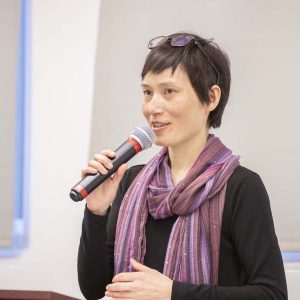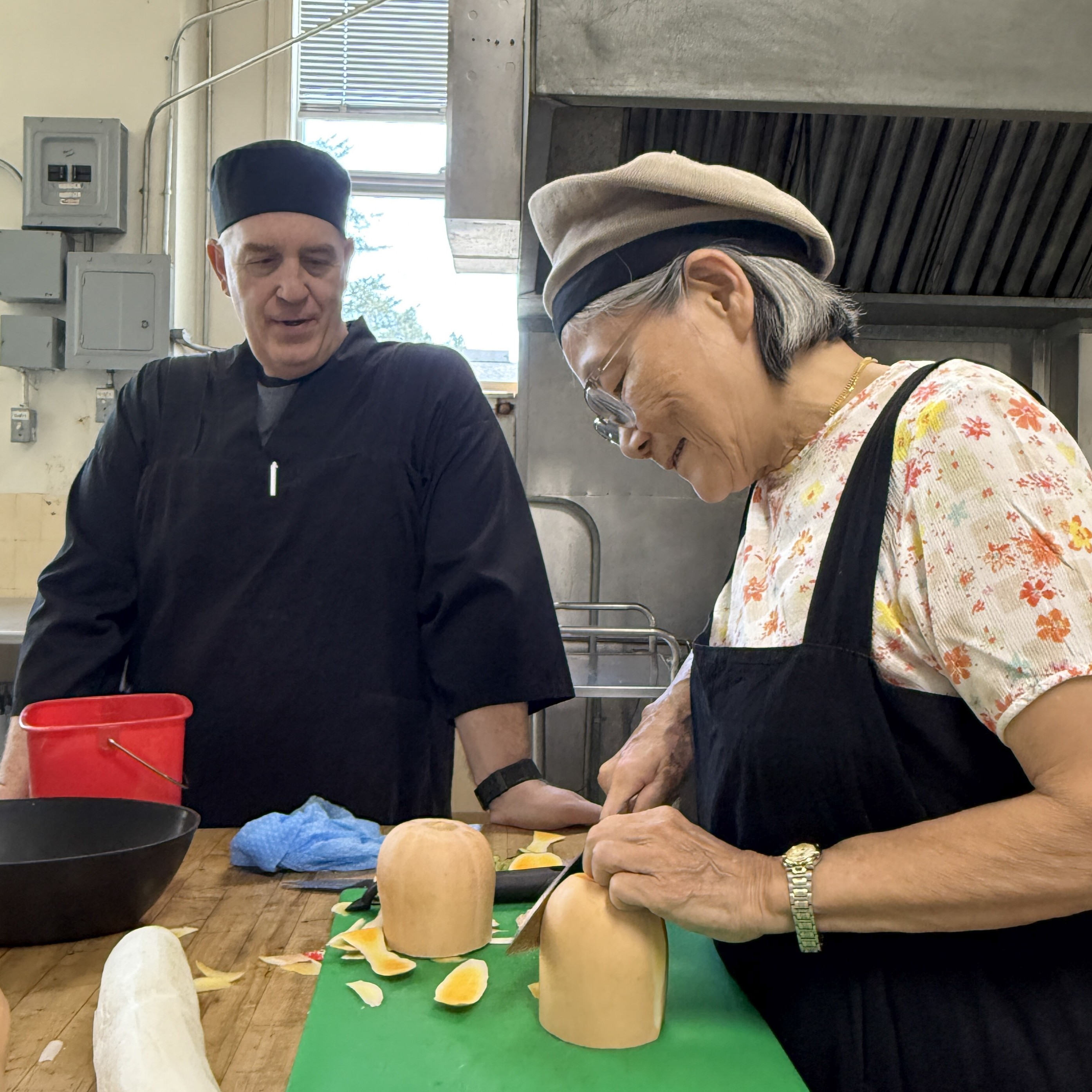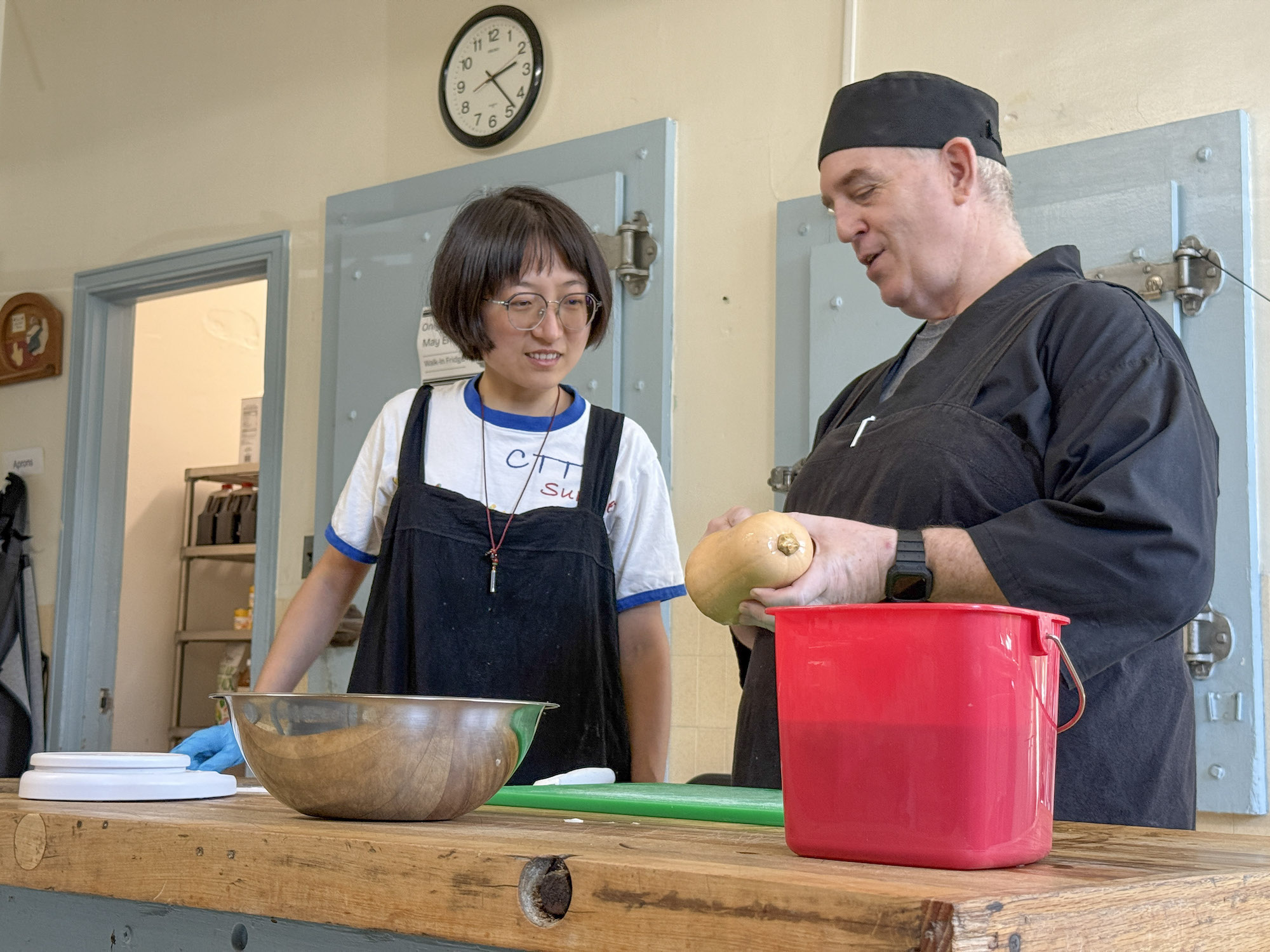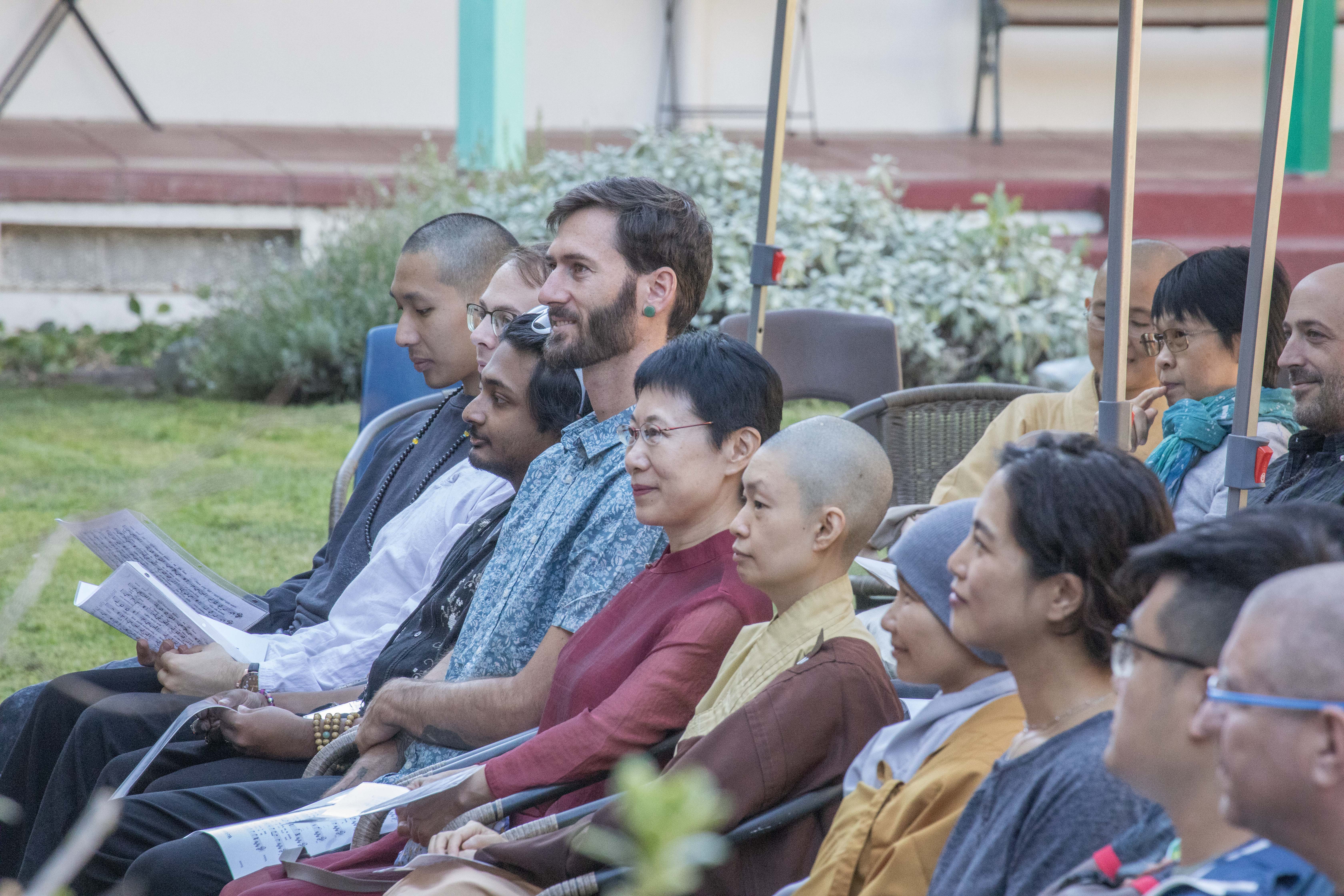
Chan Master Qiyuan and Her Poems
In this paper, Xiaojuan Shu (MA 2020, TC 2021) uses the process of translation as a hermeneutic tool to catch a glimpse of the inner landscape of Poet and Chan Master Qiyuan Xinggang 祇園行剛禪師 (1597-1654).
Chan Master Qiyuan and Her Poems
Poet and Chan Master Qiyuan Xinggang 祇園行剛禪師 (1597-1654) was one of very few female cultivators whose teaching was preserved in writing. Reading her poems feels different from reading her life story. The poems seem to be all written after her spiritual breakthrough, while her story takes us through her struggles at different phases of her life: her parents’ disapproval of her vegetarian diet, her husband’s death, depression, blockage in her cultivation, and monastic politics, etc. Her life gradually caught up with her poems as she progressed on the path of awakening. In this paper, I will retranslate some of her poems and use the process of translating to ruminate on her words and also as a hermeneutic tool to catch a glimpse of her inner landscape, hopefully. What was she really trying to convey in her poems? Why did she use poetry as a medium to communicate her messages? What mental states was she in while writing those poems? Was she able to keep her stillness in meditation while writing about it? As a highly regarded female Chan master in history, how might it have felt to be her? This paper will try to shed some light on these inquiries. Due to my limited experience in translating classical Chinese to English, the retranslation is not an attempt to prove my translation could possibly be superior to the other version, but simply to use it as a method of learning. Translating Chan Master Qiyuan’s poems along with reading her story helped me see the complexity and subtlety in and behind her poems. It is like putting hermeneutics into action with the hope of connecting with a true cultivator, from inner to inner, across time and space, if that’s possible at all.
WHY POETRY?
What do poetry and cultivation share in common? Both submit to a constrained form or style—poetry written in metrical feet and cultivation practiced with precepts. Both go deeper with less —poetry reaching profundity with fewer words and cultivation fostering inner wealth with fewer needs. Both aim for more freedom—poetry for creativity and imagination and cultivation for liberation. In a sense, we need to be in a form in order to reform and transform, and both poetry and cultivation provide a form which constraints on the outside, the superficial level, but liberates on the inside, the deeper level. The metrical foot, such as iamb, pushes one to think outside of the usual. In a similar way, A precepted simple life monitors human impulses and purifies one’s conduct. Both poetry and cultivation are meant to transcend the ordinary, if done well. Master Qiyuan was both a Chan master and a poet. Did her poetic way of thinking help her cultivate? Or did her Chan cultivation help her write better poems?
LIFE, CULTIVATION, AND POEMS
Chan Master Qiyuan Xinggang, commonly known as Chan Master Qiyuan 祇園禪師, is one of the Dharma heirs of Linji Chan School (臨濟宗) of Chinese Buddhism. Her name Qiyuan was picked from the title of Jeta’s Grove, Anathapindika’s Park (Ch. 祇樹給孤獨園 qí shù jǐ gū dú yuán), where Shakyamuni Buddha gave most of his teachings. The narration of her story in this paper is based on the original Chinese version written by Master Yikui Chaochen (一揆超琛), one of her Dharma heirs. Master Qiyuan was born in a Hu Family in Jiaxing in Zhejiang Province. She possessed a simple and straight nature and at a very young age had an inclination to recite the Buddha’s name and to bow in the morning and the evening. At age 18, she was betrothed to a young scholar, who died shortly after. But she still fulfilled her filial duty by attending to her parents-in-law. One day, she suddenly fell into a sense of despair while reflecting on the emptiness of this fleeting life without a way out. Her distress increased day by day, and she felt ashamed for not being able to seek knowledge or ask for guidance. Day and night, she knelt before the Buddha [image or statue] and vowed to awaken to the Way before her life ended. She was the only child of her parents, who cared for her as if she were a precious pearl held in their palms. When her parents tried to dissuade her from eating only vegetarian food, she fasted until they changed their minds. She struggled with the question of where she should establish her life and felt dejected that her time was passing by in futility. After both of her parents passed away, she made up her mind to leave the home life and gave away her properties, clothing and jewelry. A year later when she was 35, she went to the Linji Master Miyun Yuanwu (Ch. 密雲圓悟) to receive full monastic precepts. After receiving guidance from two most prominent Linji Chan masters of the time, Master Miyun Yuanwu and then Master Shiche Tongsheng (Ch. 石車通乘), Master Qiyuan went back to her solitary place to continue her meditation practice (Yikui).
MEDITATION
Chan meditation played a significant role in Master Qiyuan’s cultivation. Master Shiche Tongsheng instructed her to use huatou, the meditation topic: What’s your original face before your parents gave birth to you? (Ch. 參父母未生前本來面目, cān fù mǔ weì shēng qián běn lái miàn mù). But she had difficulties in making progress. When she returned for further guidance a year later, Master Shiche Tongsheng said to her that if she didn’t realize the great awakening after that visit, she should not meet him again. She went back to investigate the huatou with more vigor and wept in front of the Buddha for her ignorance. One day she experienced an intense mental state, and due to her eagerness, she vomited three bowls of blood, but still didn’t cease her quest. With further guidance from Master Shiche Tongsheng, she vowed that she would not stop practicing until she had penetrated the practice and realized the Way. Later during her meditation, she had a breakthrough with the huatou and wrote a verse: “Before parents gave birth to me, my nature was empty, profound, clear, still, and complete. Originally, it lacks nothing; as clouds disperse, the blue sky reveals itself.” One afternoon, she felt her body and mind were suddenly shattered, with no sense perceptions arising through the contact of the six senses. She went back to Master Shiche Tongsheng, who tested and certified her spiritual breakthrough. She spoke a verse: “Original nature is complete and luminous throughout the great thousand worlds. True reality manifests through myriad conditions without obstructions. The essential nature revealed in individual phenomenon can radiate through heaven and earth, illuminating beyond the impermanent existence” (Yikui).
The following are my translations of her poems. Meditation is one of the recurring themes in her poems.
蒲團 The Meditation Mat
蒲 團 一 片 絕 遮 攔 A single piece of circular mat has no cover or fence,
覆 天 翻 地 在 處 安 [yet even if] heaven and earth were overturned, here is peace.
聖 號 凡 名 都 坐 斷 Both sage titles and worldly fame lose their grip in the sitting,
大 千 收 在 一 毫 端 and the infinite world is reduced to the tip of a hair.
This poem describes meditation as such a supreme state that it might trigger the readers to have some romantic ideas about meditation. But after reading her story, I know that such a fearless, peaceful, and liberated state in sitting didn’t just fall out of the sky. Without her vigorous practice of over a decade in meditation and enduring what ordinary people couldn’t endure, she wouldn’t have reached such a high state. But what propelled her to practice so diligently even when her body was on the verge of collapsing? Why was the quest for her “original face” so important that she couldn’t care less about her physical body? Why was she able to see the emptiness in her fleeting life at a young age before meeting any teachers? It was mentioned that she liked to recite the Buddha’s name and bow at a very young age. Could it be that her parents influenced her? If so, her parents should have supported her to eat vegetarian food, instead of dissuading her from it. I don’t know the answers to these questions, but feel intrigued and inspired by her perseverance and vigor in cultivation.
AN UNATTACHED MIND
Although she was one of the Dharma heirs of Linji Chan School, her name was not listed as one of the “official” patriarchs (see 再增訂佛祖道影). It may be due to the fact that women cultivators were simply ignored. But Master Qiyuan had no interest in building fame for herself anyway. Similar to the Sixth Patriarch, who hid from the public for 16 years after receiving the robe and bowl from the Fifth Patriarch, Master Qiyuan retreated to her old solitary place to continue her vigorous practice in the following nine years, after receiving the Dharma transmission from Master Shiche Tongsheng. She would have remained in her solitude if it weren’t for the local lay followers who beseeched her to come out. She finally agreed and became abbess of the monastery whose name was later changed to Crouching Lion Chan Monastery, which flourished because of her. When she first came out, some people questioned whether a nun would be capable of exerting much influence on that town. But soon, they were impressed by the disciplines that she established and drawn to her teaching in investigating Chan, and her awe-inspiring appearance and manner, extraordinary skills and high virtue. She treated all who came to her equally, disregarding their social status. Her compassion, like an all-encompassing ocean, transformed numerous minds. After meeting her, wrongdoers began to repent and reform, prejudiced members from the noble class became humble, and eloquent intellectuals suddenly lost their wits. One time, she was asked to travel to a place to bless a newly structured chan hall. Before her boat reached the bank, thousands of people were already gathered there kneeling down to request for Dharma. Day and night, the streets and alleys were filled with sincere lay people who treated her as if she were a living Buddha. Many came from out of town just to catch a glimpse of her compassionate face. Master Qiyuan declined many invitations and offerings. Unaffected by all these, she was like a wild crane gliding through floating clouds (Yikui).
After eight years of leading the sangha at Crouching Lion Chan Monastery, she returned humbly to her solitary practice. The following poem was written during a retreat, but it’s not clear to me if it was written before, during or after the eight years at Crouching Lion Monastery.
孟 夏 關 中 閒 詠 A Poem Written at Leisure in the First Month of Summer Retreat
諸 老 門 庭 家 業 盛 Relying on the reputation of all preceding masters, the lineage flourishes.
自 知 疏 拙 隱 為 安 Knowing myself, boorish and blunt, I find peace in hermetic life.
玄 機 棒 喝 都 休 歇 Wondrous truth, strikes and shouts are all put to rest.
萬 法 虛 融 莫 問 禪 All dharmas are empty and interconnected; there is no need to investigate Chan.
百 結 鶉 衣 倒 掛 肩 A worn, patched robe hangs from my shoulders.
饑 來 喫 飯 倦 時 眠 When hunger comes, I eat; when tired, I sleep.
蒲 團 穩 坐 渾 忘 世 Sitting firmly on a meditation mat, I completely forget the world,
一 任 窗 前 日 月 遷 as the sun and moon shift as they please by the window.
高 臥 雲 嶒 寄 幻 軀 Lying high on lofty clouds, my illusory body rests;
白 雲 翠 竹 兩 依 依 toward each other, white clouds and green bamboo lean.
眼 前 幻 境 隨 遷 變 Before the eyes, delusive phenomena keep changing;
深 掩 柴 扉 樂 有 餘 behind the deeply hidden wooden gate, joy overflows.
茅 舍 風 高 孰 敢 親 A thatched hut in the midst of blowing gale, who would dare come near?
棒 風 喝 月 走 煙 雲 Strike the wind and shout at the moon, [even] misty clouds linger not.
儼 然 寶 缽 虛 空 托 Solemnly, the empty space upholds a treasured bowl,
淡 飯 黃 虀 自 現 成 and plain rice and yellow pickles appear all by themselves.
In this poem, Master Qiyuan shows no attachment to her previously dedicated life, no attachment to external recognition, not even to her lifelong practice — investigating Chan. With a meditation mat, a patched robe, and a bowl of plain rice and pickles, she found peace and joy in “a thatched hut in the midst of blowing gale.” The poem reveals her fearless, free, and joyful mental state during her summer retreat.
Although Master Qiyuan Master’s joy overflowed “behind the deeply hidden wooden gate,” when she was the abbass, each word she spoke and each action she took were all to benefit others, as Master Yikui described. She took very little for herself. Whenever she was given something, she always shared it with the sangha. When her disciples were sick in bed, she herself served them medicinal soup. When they wanted to visit their parents, she reminded them that filial respect for their parents was more important than respect for her. The disciples looked up to her with great reverence, and felt her compassion and kindness when they approached her. Under her guidance, they progressed quickly and were willing to serve the Dharma for life (Yikui). After the eight years, Master Qiyuan willingly let go of her responsibilities and went back to her solitude. Did she serve out of gratitude for her teachers or her compassion for other beings? How could she be so detached from service, and yet, so engaged in it? It reminded me of what the Sixth Patriarch said about the true emptiness, “One is nowhere attached, yet everywhere engaged.”
RETURNING TO THE SOURCE
The poem Closing The Door was written after Master Qiyuan had retired from her position as an abbess. It describes her bodily action moving from doing to being, from active outer service to deeper inner service.
掩 關 Closing The Door
挈 挈 波 波 多 少 年 After many years of leading and running about with responsibilities,
杜 門 息 影 隱 林 泉 I close the door and rest in a forest hermitage.
乾 坤 踢 破 腳 收 轉 After kicking open heaven and earth, I pulled back my foot and turned.
獨 坐 寒 窗 皎 月 圓 Outside the cold window where I sat alone, a bright moon hangs full.
終 日 如 愚 頓 息 機 All day long I appear foolish, as the calculating mind has ceased;
箇 中 無 是 亦 無 非 Among all these, there is no right or wrong.
堂 堂 坐 斷 聖 凡 路 Sitting straight and tall, I cut off both sagehood and worldly path;
亙 古 彌 今 一 本 如 from ancient times to present day, it has always been so.
What captured my attention in this poem is the moon. “Outside the cold window where I sat alone, a bright moon hangs full.” The moon feels full and still here, as the present moment is being amplified, while in an earlier poem, The Meditation Mat, the moon is different. “Sitting firmly on a meditation mat, I completely forget the world, as the sun and moon shift as they please by the window.” Though the poet sits still in both poems, the moon moves and changes in one, and is still and full in another. Does this signify anything? I don’t know. But I’d like to interpret her life as having come full circle and returned to the source of perfect stillness.
Two months prior to passing into her final stillness, Master Qiyuan told a disciple about her predicted departure. Sure enough, she fell sick a month later. Her disciples knelt down in tears, begging her to see a doctor and take some medicine. She said it was not necessary since she knew it was her time. Her disciples cried without stopping. Another month passed, she appointed her Dharma heirs and arranged things. Three days before the date, she called the disciples to her place and said, “You all have followed me for many years. After I die, you should follow my wishes, not the worldly filial custom to mourn for me.” Three days later, after bathing and changing her clothes, she sat in full lotus and then left her body with a smile (Yikui).
CONCLUSION
Through poems, Master Qiyuan, a highly regarded female Chan master, shared her illuminating insight with modern day readers and cultivators across space and time. Because of her spiritual awakening, her poems seem to have an enlightening effect on me. Through translating her poems, I found great inspiration in both poetry and in Chan. Being a virtuous and compassionate role model in Chan cultivation, she became the beacon for many who came after her, especially for female cultivators who were discriminated against both in society and on the spiritual path. Master Yikui, who wrote her biography, grieved deeply even years after Master Qiyuan’s passing. In a poem she wrote, “since when have spring and fall passed without me serving her? I find myself imitating the birds crying over the fallen branches” (Grant). I don’t know if Master Qiyuan’s disciples and followers honored her wish not to mourn her in worldly custom, but there was at least one remarkable thing that came out of their mourning process. That is the circulation of Written and Spoken Words by Crouching Lion Chan Master Qiyuan (Chinese Title: 伏獅祇園禪師語錄). For that, I am forever grateful.


